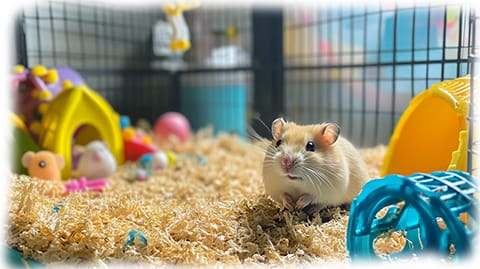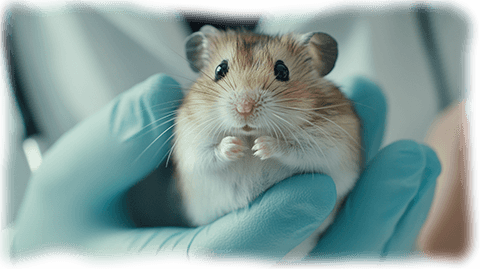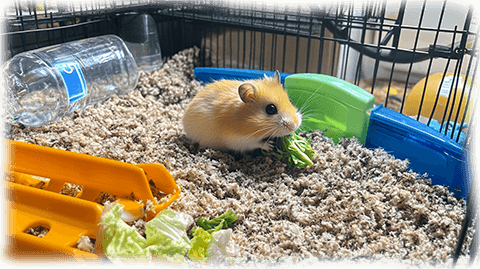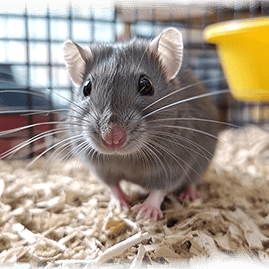Hamster Health: A Comprehensive Guide
Hamsters are small, active, and relatively low-maintenance pets, but they have specific health needs that must be addressed to keep them happy and healthy. While they often hide signs of illness, it’s important to monitor your hamster closely and provide proper care to prevent health issues. In this guide, we will discuss the most common hamster health problems, how to recognize the signs of illness, and provide tips on keeping your hamster in great shape.
Common Health Issues in Hamsters
Hamsters can suffer from a variety of health problems, many of which can be prevented with proper care and early detection.

Wet Tail
Wet tail is one of the most serious health problems in hamsters, caused by a bacterial infection that leads to severe diarrhea. This condition is often linked to stress, poor diet, or unsanitary living conditions and requires immediate attention.
- Symptoms
- Diarrhea, especially around the tail area
- Lethargy
- Loss of appetite
- Hunched posture
- A foul odor
- Treatment
- Wet tail is a medical emergency, and if your hamster shows symptoms, you must take them to the vet immediately for antibiotics and fluid therapy.
- Clean the cage thoroughly to prevent reinfection, and keep your hamster in a quiet, stress-free environment during recovery.
- Prevention
- Ensure your hamster’s cage is kept clean and dry.
- Minimize stress, especially during cage cleaning or handling.
- Provide a balanced diet with plenty of fiber.
Respiratory Infections
Hamsters are prone to respiratory infections, especially if they are exposed to drafts, poor air quality, or dusty bedding. Symptoms of respiratory infections can escalate quickly, so it’s important to act fast.
- Symptoms
- Sneezing
- Discharge from the nose or eyes
- Labored breathing
- Lethargy
- Treatment
- Take your hamster to the vet for a diagnosis and treatment, which may include antibiotics.
- Ensure your hamster is kept in a warm, dry environment free from drafts.
- Prevention
- Avoid placing your hamster’s cage in areas with drafts or poor air circulation.
- Use dust-free bedding, like paper-based or aspen bedding, and avoid pine or cedar shavings, which can irritate their respiratory system. (Amazon affiliate link)

Abscesses
Hamsters can develop abscesses—pockets of infection—due to cuts, bites, or other injuries. These may appear as swollen lumps under the skin.
- Symptoms
- Swollen, warm, or red lumps on the body
- Discharge or pus from the affected area
- Loss of appetite or lethargy
- Treatment
- Abscesses need to be treated by a vet, who will drain the abscess and may prescribe antibiotics to clear up the infection.
- Keep your hamster’s cage clean to prevent further infections.
- Prevention
- Regularly check your hamster for injuries or wounds that could lead to abscesses.
- Avoid housing hamsters together, as fighting can cause injuries that lead to abscesses.
Overgrown Teeth
Hamsters’ teeth grow continuously throughout their lives, so they need items to chew on to wear down their teeth. Overgrown teeth can cause difficulty eating and other health complications.
- Symptoms
- Difficulty eating or loss of appetite
- Drooling
- Visible overgrowth of teeth
- Treatment
- If your hamster’s teeth are overgrown, your vet may need to trim them.
- Provide safe chew toys, wooden blocks, or hamster-safe chew sticks to encourage natural wear on their teeth. (Amazon affiliate link)
- Prevention
- Always have chew toys in your hamster’s cage to allow them to keep their teeth at a healthy length.
- Regularly inspect your hamster’s teeth for signs of overgrowth.

Diarrhea (Not Caused by Wet Tail)
Hamsters can develop diarrhea from eating too many fresh vegetables, fruits, or from sudden dietary changes. While less serious than wet tail, it still needs to be managed.
- Symptoms
- Soft or runny stools
- Loss of appetite
- Dehydration (dry mouth, sunken eyes)
- Treatment
- Remove any fresh food from their diet temporarily and switch to dry food only (pellets or seeds).
- Provide plenty of fresh water to prevent dehydration.
- If symptoms persist, consult a vet.
- Prevention
- Introduce fresh foods gradually into your hamster’s diet.
- Limit the amount of fruit and vegetables to small amounts once or twice a week.
Tips for Keeping Your Hamster Healthy
Prevention is the best strategy for maintaining your hamster’s health. Here are some helpful tips to keep your hamster in top condition:
Maintain a Clean Habitat
- Clean your hamster’s cage regularly to prevent the buildup of waste, bacteria, and mold.
- Change bedding at least once a week and spot-clean the cage daily.
- Ensure your hamster has fresh water and food every day.

Provide a Balanced Diet
- Offer a high-quality commercial hamster pellet mix as the base of their diet. (Amazon affiliate link)
- Add small portions of fresh fruits and vegetables for variety, but be cautious not to overfeed fresh produce.
- Avoid sugary treats, as hamsters are prone to diabetes.
Encourage Exercise
- Hamsters are active animals, so they need opportunities to run and explore.
- Provide an exercise wheel, tunnels, and toys to keep them physically and mentally stimulated. (Amazon affiliate link)
- Hamster balls can also provide exercise, but be sure to supervise your hamster while they use it.
Monitor Behavior and Physical Health
- Regularly check your hamster for signs of illness, such as lethargy, changes in eating habits, or discharge from the eyes, nose, or mouth.
- Monitor your hamster’s weight to ensure they’re not gaining or losing weight unexpectedly.
- Be observant of your hamster’s behavior; early detection of health issues can lead to better outcomes.
Minimize Stress
- Avoid loud noises or sudden changes in the environment that could stress your hamster.
- Keep their cage in a quiet area of the house away from drafts, direct sunlight, or sudden temperature changes.
When to See a Vet
Hamsters may be small, but they require professional medical attention when they become ill. If you notice any of the following signs, it’s important to contact a vet as soon as possible:
- Lethargy or significant decrease in activity
- Loss of appetite or difficulty eating
- Changes in urination or stool
- Discharge from the eyes, nose, or mouth
- Swelling, lumps, or abnormal growths
- Labored breathing or sneezing
By catching health issues early and seeking veterinary care, you can improve your hamster’s chances of a full recovery.
Conclusion
Maintaining your hamster’s health requires careful observation and regular care. By providing a clean environment, balanced diet, and appropriate exercise, you can help prevent many common health problems. Always be mindful of the signs of illness and seek veterinary care when needed. With the right attention, your hamster can live a long and happy life.
Reading materials: “Hamster Care: The Essential Guide to Ownership, Care, & Training For Your Pet” (Amazon affiliate link) by Kate Pellham.
Affiliate Disclosure
This post may contain affiliate links, which means I earn from purchases made through links. Please see the privacy policy page for more details.






